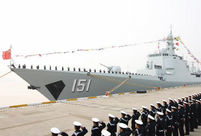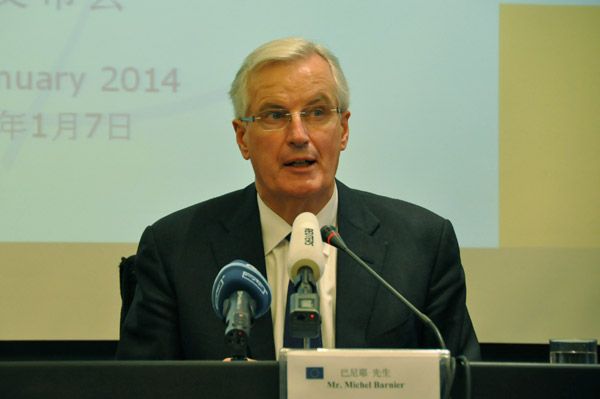 Shocking moments when PLA's weapons open fire
Shocking moments when PLA's weapons open fire Famous Lanzhou beef noodles
Famous Lanzhou beef noodles Armed Police hold anti-terrorism drill in SE China's Xiamen
Armed Police hold anti-terrorism drill in SE China's Xiamen Harbin Int'l Ice and Snow Festival opens
Harbin Int'l Ice and Snow Festival opens 'Jin' named the word of the year by cross-strait netizens
'Jin' named the word of the year by cross-strait netizens Chinese scientific expedition goes to build new Antarctica station
Chinese scientific expedition goes to build new Antarctica station
 Chinese naval escort fleet conducts replenishment in Indian Ocean
Chinese naval escort fleet conducts replenishment in Indian Ocean 17th joint patrol of Mekong River to start
17th joint patrol of Mekong River to start China's moon rover, lander photograph each other
China's moon rover, lander photograph each otherBEIJING, Jan. 9 -- Chinese Foreign Minister Wang Yi has voiced China's support for Arab states in following paths chosen by themselves and resolving the region's hotspot issues through political means.
The new Chinese government's policy towards Arab states can be summarized as "four supports," said Wang in an interview with Al Jazeera, according to a press release on the Foreign Ministry website on Thursday.
The "four supports" include that China supports Arab states in following their chosen paths; in resolving the region's hotspot issues through political means; in achieving a win-win and common development with China; in playing a bigger role in regional and international affairs and in more effectively safeguarding their legitimate rights and interests, Wang noted.
"This represents China's most fundamental position which also meets the aspiration and fundamental interests of the Arab countries and their peoples," he said.
Wang concluded his Middle East visit to Palestine, Israel, Algeria, Morocco and Saudi Arabia on Dec. 26, 2013. This was his very first visit to the Middle East region as the foreign minister of China's new government.
The trip has three goals: namely, to carry forward the relations of friendship; to deepen existing cooperation; and to promote peace talks, he said.
He commended China's traditional friendship with Arab states which was forged through the two-thousand-year old Silk Road, and China's firm support to Arab states in their cause to win national independence and liberation in modern times.
"China is committed to carrying forward the traditional friendship. My Middle East trip has achieved this goal completely, as I have felt for myself the profound goodwill of the Arab states and their peoples for China and the Chinese people," Wang added.
China works hard to deepen its cooperation with the countries in the region for mutual benefit. Last year, two-way trade reached nearly 300 billion U.S. dollars, with China becoming the top trading partner of many Arab states.
According to rough statistics, China's accumulated contractual value in the region totaled 120 billion U.S. dollars, including a substantial input in infrastructure, such as roads, bridges and factories.
Already standing at 10 billion U.S. dollars in accumulative terms, China's direct investment in the region also grew rapidly.
Wang said China's important arrangements on the comprehensive deepening of reform and opening-up made during the Third Plenum of the 18th Central Committee of the Communist Party of China will bring about fresh and important opportunities for the cooperation between China and the countries in the region.
China plans to develop a Silk Road economic belt that spans the Eurasia continent and a maritime Silk Road that links the Pacific with the Indian Ocean. The two Silk Roads will cross at the Middle East region, which spells excellent opportunities and bright prospects for common development and common prosperity of China and the region's countries, he added.
Wang told Al Jazeera he discussed many new ideas and new schemes of cooperation with Arab leaders during the visit.
"China is ready to share its experience in high-speed rail development with any country and participate in national rail network programs of the region's countries, thus benefiting these countries and their peoples," he said.
With regard to many hotspot issues in the Middle East, Wang said one key purpose of his visit is to follow through on President Xi Jinping's four-point proposal on the issue of Palestine. He also discussed the Syrian and the Iranian nuclear issues with leaders of the region's countries.
"As their friend, China is ready to contribute its share to bring peace and stability to the region. On the whole, my visit has achieved its anticipated purpose," the foreign minister said.
 Chinese Consulate General in S.F. burned for arson attack
Chinese Consulate General in S.F. burned for arson attack Roar of J-15 fighter is melody for operator on the Liaoning
Roar of J-15 fighter is melody for operator on the Liaoning A 90-year-old forester's four decades
A 90-year-old forester's four decades Most touching moments in 2013
Most touching moments in 2013 2013: Joys and sorrows of world politicians
2013: Joys and sorrows of world politicians Missile destroyer Zhengzhou commissioned to Chinese navy
Missile destroyer Zhengzhou commissioned to Chinese navy China is technically ready to explore Mars
China is technically ready to explore Mars Photo story: Life changed by mobile technology
Photo story: Life changed by mobile technology Bullet train attendants' Christmas Eve
Bullet train attendants' Christmas Eve Shocking moments when PLA's weapons open fire
Shocking moments when PLA's weapons open fire Barnier: China, EU should travel side by side on the road of reform
Barnier: China, EU should travel side by side on the road of reform 'Phubbing' people seen everywhere
'Phubbing' people seen everywhere China's bun brand to buy American coffee giant
China's bun brand to buy American coffee giant Yang Mi, Hawick Lau hold wedding in Bali
Yang Mi, Hawick Lau hold wedding in Bali Snowy, milky, cheesy Fribourg of Switzerland
Snowy, milky, cheesy Fribourg of SwitzerlandDay|Week|Month